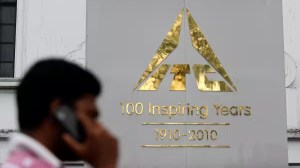In January 2015, we had reduced the ITC rating from Buy to Neutral, as we factored in a period of slower Ebit (earnings before interest and taxation) growth for the cigarette business vs. the average over the past decade.
H1FY16F (forecast) is likely to see single digit Ebit growth in the cigarette business, which reaffirms our cautious stance, and we believe the stock is likely to see a further de-rating from current levels.
We reduce our multiple for the cigarette business further from 20x (times) to 17x to reflect this risk. While we are not changing our assumption for cigarette business Ebit growth of 10% for FY16/17F, we certainly see downside risks to this number. A lower 15x multiple can drive our TP (target price) lower to R260, if the company continues to disappoint even on reduced expectations. We are also moving our multiple lower for the FMCG business from 4x sales to 2x sales.
We were earlier using the sector average multiple, but given the much lower profitability for ITC’s business, we now give it the lowest multiple in the sector. We are also cutting our estimates by 9-10% for FY16/17F as other businesses have also seen slower-than-expected performance.




Valuations: ITC trades at 21.3x FY17F vs. sector average of 30.8x. It trades at a 30% discount to sector average P/E (price-to-earnings) multiple; however, we believe this reflects the lower growth ITC will likely deliver over the medium term.
Takeaways from meeting with the company
* Share of illegal cigarettes in the industry has increased from 7-8% about 8 years back to 15%+ now. Since the prices of duty-paid cigarettes continue to move up, the price differential between legal and illegal cigarettes is increasing.
* Some states have started to put in place a ban on sale of loose cigarettes. Over 70% of the cigarettes sold in India are loose and hence this move, when implemented through the country, will be a major negative for the company.
* In the FMCG business, ITC is making steady progress, with many of the categories now profitable. However, it will continue to invest in growing the business and building the brands, which means profitability will not improve in a linear way over the medium term, in our view.
* The dairy business is small and the company is largely treating it as a CSR activity.
* Personal products continues to make slow progress, with categories such as hair care and skin care being difficult to make inroads into. The management believes it will be able to become a significant player in the market in the long term.
* ITC has a 6% share in the soaps market in India. Its brands, including Vivel and Fiama Di Wills, continue to gain traction in the market but taking the share up from 6% to 10%+ will take more time than getting to the 6% share, in our opinion.
* The company plans to invest R30bn in capex each year over the next couple of years, half of which will go into the hotels and paper business.
Cigarette business growth getting disrupted: Over the past eight years, the company has delivered an average 17.5% Ebit growth in the cigarette business. This has been one of the key drivers of the stock price in the period, as the company has had a predictable and consistent growth in cigarette, which account for 80% of its bottom line.
However, over the past two quarters, as a result of consistent and large price hikes, the Ebit growth trajectory has seen a sharp slowdown. From an average 17% over the period from 2006 to 2014, it has come down to 7.4% in H2FY15.
Margins in the cigarette business have seen a sharp 15.2 pp (percentage point) growth in the eight-year period from December 2006 to December 2014. This has been on account of the company passing on a larger price increase to consumers compared to the excise duty hike seen each year. There has also been some mix improvement which has helped drive margins higher in the business. Volume growth over the last decade has been closer to 2.5%.
How has the indexed pricing of cigarette moved? As we look at the indexed pricing of a stick for ITC, it has seen a near 3x increase in the FY03-15F period. Our base case assumptions build in another 15% increase over the next couple of years, implying that prices at the end of FY17F would have increased by 4x. This level of inflation in product prices clearly will have an impact on volumes going forward.H1FY15 saw volumes decline by 5% y-o-y and Q3FY15 saw that decline accelerate to 11%, which is the highest y-o-y decline in the last decade.
Given the sharp quantum of non-stop price increases over the past three years, we believe there has been a shift towards other forms of tobacco, including illegal cigarettes, over the past couple of years. Volume growth in the cigarette business, which has never really been more than 2-3% over a longer period of time, can come down further from current levels. We also believe the current government is a lot harsher in its stance on tobacco and hence we are now building in a 15% increase in excise duty going forward.
For Updates Check Stock Market News; follow us on Facebook and Twitter






















